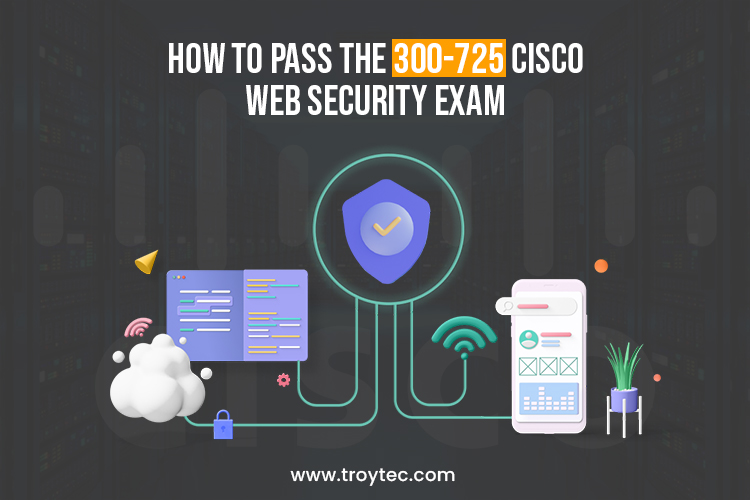Introduction
Securing the Internet using 300-725 Cisco Web Security certification test The Web Security Appliance-SWSA v3.0 course teaches you how to build, use, and maintain the Cisco Web Security Appliances (WSA), supported by Cisco Talos to provide sophisticated email defense and management against website security threats.
You’ll learn how to deploy proxy sites, use authentication, implement policies to regulate HTTPS traffic and access, employ use control settings and regulations, use the solution’s malware protection features, implement information security and data loss prevention, administer the Cisco WSA solution, and more through a mixture of professional guidance and hands-on practice.
One of the emphasis choices for the CCNP Security Certification is Protecting the 300-725 Cisco exam certification. To obtain the CCNP Security certification, you must pass the Developing and Operating Cisco Cybersecurity Core Systems (350-701 SCOR) or the corresponding exam.
The CCNP 300-725 Cisco Web Security exam certification equips you for professional-level jobs in security-related fields today. CCNP Security certification, one of the greatest sought-after in the industry, certifies the essential knowledge you need while allowing you to choose a particular area.
This blog will concentrate on the 300-725 SWSA: Securing your website with the Cisco Web Cybersecurity Appliance CCNP Security Specialization test. This exam evaluates your understanding of the Cisco web security appliances. The 300-725 Cisco Web Security exam certification test is an essential step toward advancing your career in the CCNP Security area. You can get the certification if you want to work in online security.
Continue exploring and reading to learn more amazing facts about the 300-725 Cisco Web Security Exam.
What is 300-725 Cisco Web Security Exam Certification?
The 300-725 Cisco Web Security Exam Certification is a professional certificate for IT professionals interested in web security. This accreditation is a component of Cisco’s comprehensive certification course, which is well-known in the IT sector.
Candidates must demonstrate competency in implementing and maintaining online security applications using Cisco technology to get the 300-725 accreditation. This includes secure web entrances or gateways, URL filtration, preventing malware, and data loss avoidance.
This certification indicates a thorough understanding of online security principles and the ability to implement Cisco’s solutions effectively in real-world circumstances. It’s beneficial for IT workers who work in areas where online traffic and data consistency are critical.
Preparation for the 300-725 Cisco Web Security exam often consists of direct experience, independent learning, and maybe formal training courses. It is critical for achievement in this certification to stay current with Cisco’s latest technology and best practices.
Why is 300-725 Cisco Web Security Certification Important?
The Cisco Web Security Certification 300-725 is significant in cybersecurity. This certification is intended to confirm the abilities and knowledge required to secure a company’s web communication and architecture.
It provides professionals with a thorough understanding of online security ideas, protocols, and technologies. Secure web entry point solutions, proxy servers, and SSL decrypt techniques are among the subjects covered. This knowledge is essential for protecting networks against various web-based threats, including malware, phishing attempts, and data breaches.
The certification concentrates on Cisco’s online security alternatives, which are well-known for their efficacy and dependability. Professionals with this certification are well-versed in deploying, managing, and debugging Cisco Web Security Appliances, which are critical in protecting a company’s web traffic.
Obtaining the 300-725 Cisco Web Security exam Certification shows dedication to staying current in the fast-growing cybersecurity sector. It demonstrates a professional’s commitment to learning the most up-to-date tools and procedures for defending against new hazards.
Hiring or having individuals with this qualification is an investment in improved security posture from an organizational standpoint. It entails having professionals who can proactively detect vulnerabilities, deploy strong safety precautions, and respond to incidents effectively.
Overall, the 300-725 Cisco Web Security exam attests to an individual’s expertise in securing web relationships, making them a vital asset in any business’s cybersecurity strategy.
Who is a 300-725 Cisco-Certified Web Security Professional?
Cisco offers the 300-725 SWSA-Securing the Internet with Cisco Web Safety Appliance) Professional certification. This certification is for IT workers specializing in online security, specifically those dealing with Cisco’s online Security Appliance (WSA).
Candidates must pass the accompanying test to become a 300-725 SWSA Professional, which assesses their understanding and abilities in web security, virus protection, URL screening, and various other aspects of protecting web traffic inside an enterprise.
This certification recognizes professionals’ competence in building and administering web security solutions utilizing Cisco’s WSA. They are skilled in detecting and mitigating online threats, which is critical in today’s cybersecurity market, as web-based attacks are expected.
Having 300-725 SWSA Experts on staff can be a valuable asset to enterprises since it shows a dedication to providing an enjoyable online experience for users and safeguarding sensitive data from web-based dangers.
Skills Required to Become a 300-725 Certified Cisco Web Security Professional

To become a Cisco 300-725 SWSA Professional, you must have a broad set of cybersecurity and secure access skills and expertise. This 300-725 Cisco Web Security exam certification emphasizes advanced security technology implementation and debugging inside a Cisco environment. The following are the essential skills you must have after passing the 300-725 Cisco Web Security Exam:
- Network Security Fundamentals: A solid understanding of network security fundamentals, such as firewalls, systems for detecting and preventing intrusions (IDPS), and virtual personal networks (VPNs), is required.
- Endpoint Security: Knowing how to safeguard endpoints, like laptops, cellphones, and tablets, is critical for defending against various cyber threats.
- Secure Access Solutions: This certification requires proficiency in carrying out and overseeing secure access solutions, incorporating the Cisco Identification Services Engine (ISE).
- Authentication and Authorization: Understanding authentication technologies such as the RADIUS protocol, TACACS+, and multiple kinds of certificates is essential for limiting network resource access.
- Advanced Malware Protection (AMP): It is critical to be familiar with Cisco’s AMP remedies, which provide comprehensive protection against malware and additional advanced threats.
- Web Security & Email Protection: Knowing how to safeguard web traffic and email conversations is critical for averting cyber assaults frequently using these channels.
- Secure Transportation Solutions: Understanding technologies such as Cisco, The AnyConnect application, and MDM (Mobile Device Management) solutions is critical for safeguarding mobile devices and providing secure remote access.
- Policies for Secure Networking Access: Maintaining a safe network environment requires designing and enforcing network accessibility restrictions based on user roles, device kinds, and other relevant data.
- Security Surveillance and Incident Response: Monitoring internet traffic for suspicious activities and efficiently responding to security issues is crucial to preserving a secure environment.
- Compliance and Risk Management: Addressing based on industry compliance regulations and being able to analyze and manage security risks are critical in assuring an organization’s overall safety posture.
- Troubleshooting Skills: Identifying and fixing security-related issues is critical for network accessibility and security.
- Comprehensive Understanding of Cisco Products: For successful deployment and troubleshooting, a thorough grasp of Cisco’s product portfolio, including routers, switches, network firewalls, and protection appliances, is required.
- Communication Skills: The capacity to clearly and concisely explain complicated technical knowledge, both in writing and vocally, is essential for engaging with colleagues and stakeholders.
Remember that earning the 300-725 Cisco Web Security exam certification requires more than just passing an exam; it also requires demonstrating an in-depth comprehension of and practical skill in safeguarding Cisco infrastructure against a wide range of cyber threats. Maintaining this level of proficiency requires ongoing learning and practical experience.
What is the 300-725 Cisco Web Security Exam?
Cisco Systems offers the 300-725 Cisco Web Security exam as a certification test. Its purpose is to assess a candidate’s knowledge and ability in deploying, establishing, administering, and supporting Cisco Web Security products. Examples include web Safety Appliances, Web Security Virtualized Appliances, and Cisco Umbrella.
Web filtering, safety measures, HTTPS, and data caching are among the topics covered in the exam. It also dives into authentication, decoding policies, and AD integration.
Candidates should know networking foundations, security notions, and a thorough comprehension of Cisco’s online security solutions to thrive on this 300-725 Cisco Web Security exam. Experience in installing and handling these systems is priceless.
Hands-on expertise, examining official Cisco documentation, and maybe enrolling in Cisco-approved educational programs are typical preparation methods. Furthermore, mock tests and labs might be helpful in determining one’s preparation for the actual 300-725 Cisco Web Security exam. Remember that remaining current with the newest developments and technologies in internet safety is also essential for certification achievement.
300-725 Cisco Web Security Exam Details
The 300-725 Cisco Web Security exam lasts 90 minutes and comprises 55-65 questions. This Cisco exam is related with the CCNP Security and Cisco Certified Expert – Web Content Safety certifications, and it assesses knowledge of the Cisco Web Security Appliance, decoding policies, proper utilization control settings, including proxies and authentication, distinguished traffic access policies and recognition policies, protection against malware and data security, and hacking prevention.
Here are the exam details and 300-725 Cisco Exam certification cost:
- Exam Name: Cisco Web Security CCNA
- Exam Code: 300-725 SWSA
- Exam Duration: 1 hour and 30 minutes
- Format: MCQs and Multi-response queries
- Exam Type: Professional
- Number of Questions: 60 to 75
- Exam Cost: $300 USD
- Status: Live
- Exam Registration: Pearson VUE
- Exam Language: Japanese and English Only
- Passing Score: 750 out of 1000
Perquisites for the 300-725 Cisco Web Security Exam
To fully benefit from this 300-725 Cisco Web Security exam course, you should be familiar with the following topics:
- The Domain Name System, Secure Shell Interface (SSH), FTP, a network management protocol-SNMP, the Hypertext Transfer Protocol, and HTTPS are all TCP/IP services.
- Routing over IP
You should have a number of those mentioned above basic technical abilities or knowledge:
- Cisco certification (CCENT level or higher)
- Certifications relevant to the industry [International Information Technology Security Certification Committee ((ISC)2, Computing Technologies]
- Security+, Worldwide Council of Electronic Commerce Advisers (EC-Council), Global Data Protection Accreditation (GIAC), ISACA] Industry Association (CompTIA)
- The Cisco Networking Academy achievement letter (CCNA 1 and CCNA 2)
- Microsoft [Microsoft Specialist, Microsoft Corporation Certified Systems Associate (MCSA), Microsoft Certification Solutions Experienced Professionals (MCSE)], CompTIA (A+, Network+, Server+) Windows competence
- Prior knowledge of the Domain Name System and SMTP structure
- Thorough comprehension of TCP/IP services
- Understanding of the fundamentals of Web Proxy
- Working knowledge of Cisco IOS systems and the Cisco ASA safety appliance
- Understanding of network safety technologies
- Basic knowledge of web security
- Previous network management experience.
300-725 Cisco Web Security Exam Domains

Here are the best domains you must know if you want to pass the 300-725 Cisco Web Security Exam:
Domain 1: Cisco WSA Description
- Use of Technology
- Cisco WSA Service
- Cisco WSA Advantages
- WSA Architecture Cisco
- Service of Proxies
- Layer 4 Transport Monitor Integrated
- Data Loss Avoidance
- Cognitive Intelligence from Cisco
- Management Instruments
- Advanced Web Protection from Cisco
- Third-Party Connectivity (AWSR) and Reporting
- SMA (Cisco Contents Safety Management Appliance)
Domain 2: Setting Up Proxy Services
- Transparent Mode vs. Strong Forward Mode
- Mode of Transparency Traffic Rerouting
- Web Cache Controlling Protocol (WCCP)
- Protocol for Web Cache Communications
- (WCCP) Flow Upstream and the Downstream process
- Bypassing the Proxy
- Caching through proxies
- Files Proxy server Auto-Config (PAC) FTP Proxy
- Proxy for Socket Secured (SOCKS)
- HTTP Headers and Gateway Access Log
- End User Notice (EUN) Pages for Customizing Error Notifications
Domain 3: Making Use of Authentication
- Protocols for authenticating users
- Realms of Authentication
- Keeping Track of User Credentials
- Transparent Proxy Option and Explicit (Forward) Proxy Mode
- Using Problematic Agents to Avoid Authentication
- Authentication and Monitoring
- Re-Authentication
- Authentication with an FTP Proxy
- Troubleshooting Domain Membership and Authentication
- Cisco Identity Solutions Engine (ISE) integration
Domain 4: Developing Decryption Policies for HTTPS Traffic
- Overview of Transportation Layer Security (TLS)/Secure Socket Layer (SSL) Inspections
- Overview of the Certificate
- A Summary of HTTPS The Decoding Process Policies
- Using the HTTPS Proxy Function
- HTTPS Inspection Controlled Access List (ACL) Tags
- Examples of Access Logs
Domain 5: Understanding Distinguished Traffic
- Identification Accounts and Access Policies
- A Summary of Access Policies
- Access Policy Committees
- Identification Profiles Outline
- Authentication and Authentication Profiles
- Identification Accounts and Access Policies
- Order Processing
- Other Policy Forms
- Examples of Access Logs
- Policy Groups and ACL Decision Tags
- Implementing Time-Based and Traffic Quantity Restrictions
- End User Notices and Acceptable Use Policies
Domain 6: Defending Against Malware
- Filters for Online Reputation
- Scanning for Malware
- Outbound Traffic Examination
- Anti-malware and Policy Reputation
- Filtering and Analysis of File Reputation
- Cisco Malware Protection Advanced
- Features for File Reliability and Analysis
- Cisco Cognitive Computing Integration
Domain 7: Enforcing Authorized Use Control Configuration
- Controlling Internet Use
- Filtering URLs
- Solutions for URL Categories
- Engine for Dynamic Content Analysis
- Control and visibility of web applications
- Enforcing Media Bandwidth Restrictions
- Access Control for Software-as-a-Service (SaaS)
- Adult Material Filtering
Domain 8: Data Security and Prevention of Data Loss
- Data Safety
- Data Safety Solution from Cisco
- Definitions of Data Security Policies
- Logs of Data Security
Domain 9: Administration and Maintenance
- Keep an eye on the Cisco Website Security Appliance.
- WSA Reports from Cisco
- Logging System Activity
- Tasks in System Management
- Troubleshooting
- CLI stands for Command Line Interface.
Domain 10: Resources
- Cisco WSA Model Comparison
- Cisco SMA Model Comparison
- Connect, Download, and Setup Overview
- Implementing Cisco Web Security
- Template for the Appliance Open Virtualized Format (OVF).
- Cisco Web Safety Appliance Mapping
- Connecting Virtual Machines (VM) Ports to the Correct Networks
- Linking to the Cisco Web Protection Virtual Appliance
- Activating Layer 4 Traffic Monitor (L4TM) Using the System Setup Wizard
- Reestablishing connectivity with the Cisco Web Security Appliance
- Overview of High Availability
- Hardware Replication
- Introducing the Common Addressing Redundancy Protocol (CARP).
- Setting Up Failover Clusters for High Availability
- Feature Comparison of Traffic Rerouting Options
- Scenarios for Architecture When Implementing Cisco AnyConnect Secure Mobility
Domain 11: Lab Plan
- Set up the Cisco Website Security Appliance.
- Install Proxy Services
- Setup Proxy Authentication
- Set up HTTPS Inspection
- Develop and Implement a Time/Date-Based Appropriate Use Policy
- Setup Advanced Malware Protection
- Set Referrer Header Restrictions
- Make use of third-party safety feeds, including MS Office 365 external feeds.
- Validate a Middle Certificate
- View Web Tracking and Monitoring Services.
- Carry out Cisco Async OS Centralized
- Cisco SMA Software Upgrade
How to Pass the 300-725 Cisco Web Security Exam?

Here are some tactical, practical, and tried-and-true suggestions to help you pass the Cisco exam with flying colors.
- Understand The Cisco 300-725 SWSA Exam Content
It is critical to understand which topics are covered in the test syllabus and which sections are your most substantial areas and will require further study and practice to grasp.
- Create A Workable Study Plan
Developing a practical and achievable study plan is critical for 300-725 Cisco Web Security exam preparation. Define specific goals for your comprehensive preparation so that you know when you’ve met them. Manage your schedule wisely, deciding how much effort you can devote to exam study each day.
Finally, be sure that you are studying from the materials that will be most beneficial to you. The exam can be challenging, but you are bound to succeed with a solid study strategy.
-
Obtain The Required Research Resources
Your previous expertise and interest in the topic will impact your selected study materials. However, regardless of your experience level, you must study from three to four sources. You can take an online course, purchase study guides and online videos, and take a practice test.
-
Pass The Cisco 300-725 SWSA Mock Exam
Taking the Cisco 300-725 SWSA practice exam is one of the finest approaches to improving exam performance. They will familiarize you with the exam format and assist you in determining which topics require additional preparation. The Cisco 300-725 practice exam will reveal what you understand well and what you need to review more thoroughly before the exam—regularly studying the 300-725 Cisco Web Security exam dumps to pass the exam quickly. Taking practice tests helps you better your time organization and accuracy.
-
Actively Take Part In An Online Discussion
Online study groups and communities can be pretty beneficial in preparing for the Cisco SWSA test. As a member of such organizations or study groups, you can ask questions and assist others in resolving their problems. You can also learn about valuable tools and ideas for passing the exam successfully.
Conclusion
These are some of the most important things to know and do if you plan to take the 300-725 Cisco Web Security exam. The CCNP Security certificate can be precious to your career, so you should devote your full attention to 300-725 Cisco Web Security exam preparation.
Passing the 300-725 Cisco Web Security Exam is crucial to becoming a skilled network security specialist. This road map, which emphasizes comprehensive study resources, practical knowledge, and strategic exam preparation, presents a clear path to success.
Remember that the foundations of success are a thorough understanding of online security concepts, hands-on practice, and expertise with Cisco’s technologies. Utilize practice examinations, participate in practical labs, and seek out additional materials for a well-rounded preparation.
Furthermore, maintaining current market developments and Cisco’s emerging technologies is critical for exam success. Participating in discussions, workshops, and webinars regularly can be extremely valuable. Comment your worthwhile queries to get the best answer from our expert team!

